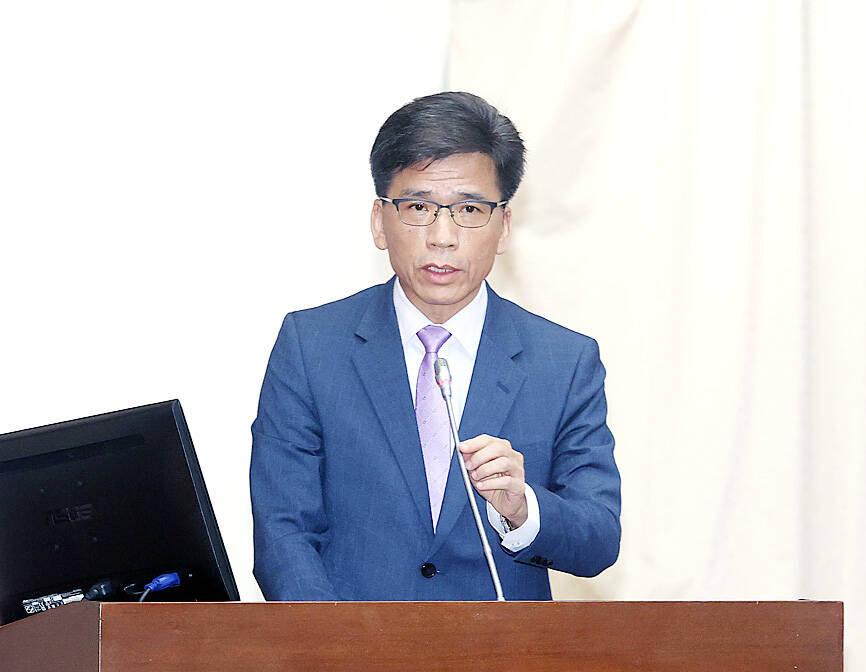Overseas investment would remain capped at 45 percent of local insurers’ total assets, as there are scant investment tools at home and potentially significant losses from sudden divestments, the Financial Supervisory Commission (FSC) said yesterday.
The commission’s comments came in response to a legislator’s concern over the effect of a proposed revision to the Insurance Act (保險法) to lower the upper limit to 25 percent.
The revision was proposed by Chinese Nationalist Party (KMT) Legislator Lo Ming-tsai (羅明才).

Photo: CNA
The proposed 25 percent cap is even lower than the 35 percent implemented before 2007. About 17 years ago, the legislature raised the upper limit to 45 percent.
“The FSC keeps a conservative attitude about such adjustments,” FSC Chairman Peng Jin-lung (彭金隆) said at a meeting of the legislature’s Finance Committee in Taipei.
“In our view, it will be more practical for [insurance companies] to manage businesses if such changes are not made,” he said.
About NT$9 trillion (US$275.8 billion) of overseas assets would have to be allocated back home if the upper limit were lowered to 25 percent, Peng said.
As many of the overseas investments, about 70 to 80 percent, are in foreign bonds, which deliver long-term and stable returns, insurers would incur massive losses if they were forced to sell at a discount before they mature, he said.
In addition, insurers would not be able to sell at a premium above par, especially as the US Federal Reserve and other major central banks are expected to cut key interest rates, he said.
Taiwan’s bond market is comparatively small and would not be able to absorb such an influx of funds, Peng said.
It would be difficult to track where the funds went, he said in reply to Democratic Progressive Party Legislator Wu Ping-jui’s (吳秉叡) question about whether a huge inflow of funds would inundate the local housing and stock markets.
“Stocks and real estate are the common targets of insurance companies, as they do not require permission to invest in,” Peng said.
Wu asked central bank Deputy Governor Yen Tzung-ta (嚴宗大) whether a huge inflow of funds in a short period would lead to the appreciation of the New Taiwan dollar.
“That is a question loaded with assumptions,” Yen said.
Taiwan, like many economies that have a current-account surplus, usually encourages insurance and government funds to invest overseas, which is essential to balance the economy, Yen said.

TAKING STOCK: A Taiwanese cookware firm in Vietnam urged customers to assess inventory or place orders early so shipments can reach the US while tariffs are paused Taiwanese businesses in Vietnam are exploring alternatives after the White House imposed a 46 percent import duty on Vietnamese goods, following US President Donald Trump’s announcement of “reciprocal” tariffs on the US’ trading partners. Lo Shih-liang (羅世良), chairman of Brico Industry Co (裕茂工業), a Taiwanese company that manufactures cast iron cookware and stove components in Vietnam, said that more than 40 percent of his business was tied to the US market, describing the constant US policy shifts as an emotional roller coaster. “I work during the day and stay up all night watching the news. I’ve been following US news until 3am

UNCERTAINTY: Innolux activated a stringent supply chain management mechanism, as it did during the COVID-19 pandemic, to ensure optimal inventory levels for customers Flat-panel display makers AUO Corp (友達) and Innolux Corp (群創) yesterday said that about 12 to 20 percent of their display business is at risk of potential US tariffs and that they would relocate production or shipment destinations to mitigate the levies’ effects. US tariffs would have a direct impact of US$200 million on AUO’s revenue, company chairman Paul Peng (彭雙浪) told reporters on the sidelines of the Touch Taiwan trade show in Taipei yesterday. That would make up about 12 percent of the company’s overall revenue. To cope with the tariff uncertainty, AUO plans to allocate its production to manufacturing facilities in

COLLABORATION: Given Taiwan’s key position in global supply chains, the US firm is discussing strategies with local partners and clients to deal with global uncertainties Advanced Micro Devices Inc (AMD) yesterday said it is meeting with local ecosystem partners, including Taiwan Semiconductor Manufacturing Co (TSMC, 台積電), to discuss strategies, including long-term manufacturing, to navigate uncertainties such as US tariffs, as Taiwan occupies an important position in global supply chains. AMD chief executive officer Lisa Su (蘇姿丰) told reporters that Taiwan is an important part of the chip designer’s ecosystem and she is discussing with partners and customers in Taiwan to forge strong collaborations on different areas during this critical period. AMD has just become the first artificial-intelligence (AI) server chip customer of TSMC to utilize its advanced

Six years ago, LVMH’s billionaire CEO Bernard Arnault and US President Donald Trump cut the blue ribbon on a factory in rural Texas that would make designer handbags for Louis Vuitton, one of the world’s best-known luxury brands. However, since the high-profile opening, the factory has faced a host of problems limiting production, 11 former Louis Vuitton employees said. The site has consistently ranked among the worst-performing for Louis Vuitton globally, “significantly” underperforming other facilities, said three former Louis Vuitton workers and a senior industry source, who cited internal rankings shared with staff. The plant’s problems — which have not